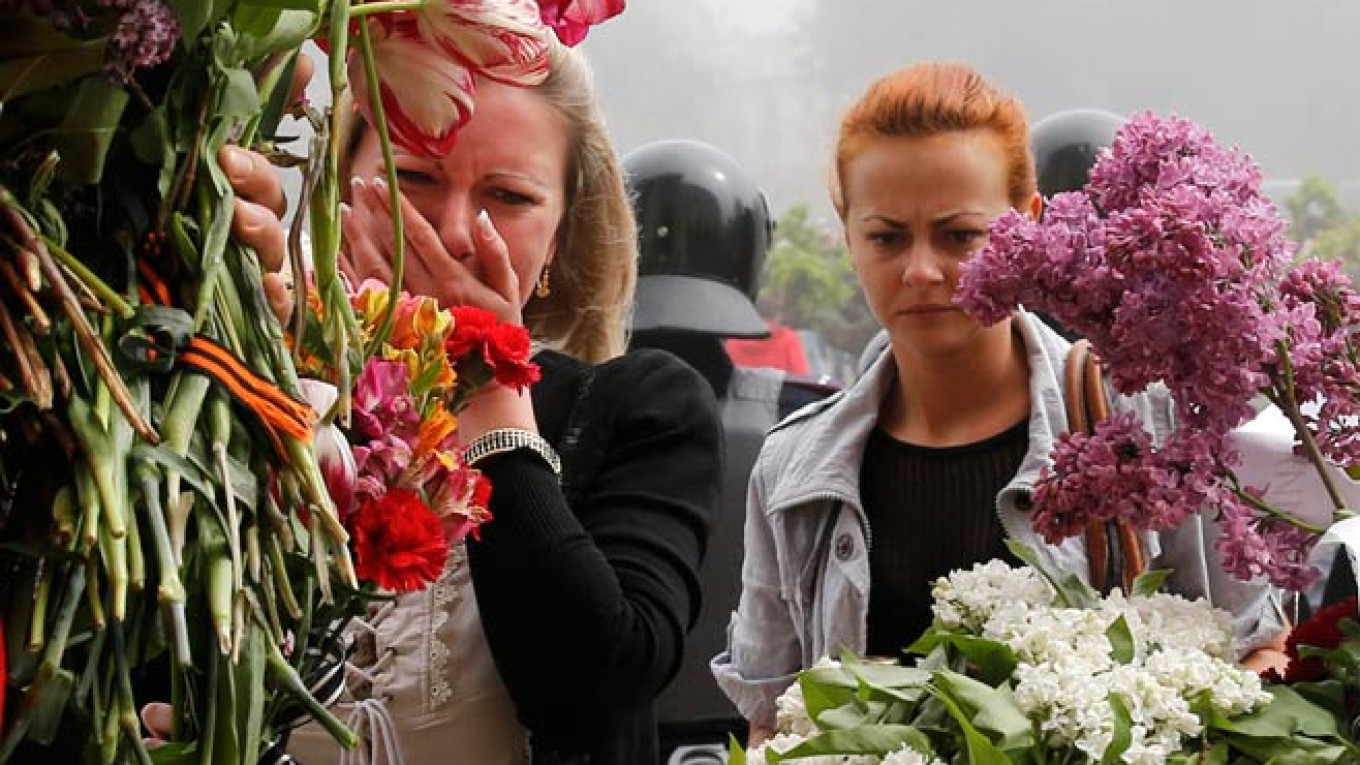Amid calls to send Russian troops to quell violence in Ukraine's east, President Vladimir Putin is monitoring the situation closely and holding meetings and calls with relevant officials day and night, his spokesman said Sunday.
"We believe we should have a common interpretation of what is happening in Ukraine, but unfortunately we do not see that Europe and the U.S. are sane in their assessments," Kremlin spokesman Dmitry Peskov told The Moscow Times in a phone interview.
"Russia is trying to achieve tangible results as we saw in the case of the release of OSCE observers, but despite our efforts, the situation there is only getting worse," he said.
Last week, Putin sent his envoy Vladimir Lukin to the city of Slovyansk, a stronghold of pro-Russian unrest in Ukraine's east, to help negotiate the release of 12 European military observers on Saturday.
As violence and chaos spread throughout Ukraine's restive southeast over the weekend, claiming at least 42 lives in the Black Sea city of Odessa, Russian lawmakers and authorities lashed out at Ukraine's authorities in Kiev and what they described as their puppet masters in the West.
The Kremlin has accused the Ukrainian government and the West of provoking the conflict in Odessa, while authorities in Kiev said the unrest was orchestrated by Russian security forces.
Sergei Mironov, leader of the A Just Russia Party, one of four parties elected to the State Duma, called for Russian troops to cross the border with Ukraine.
"Fascist scoundrels must be crushed in their own nests! We need to get troops there to defend our brothers and stop banderite fascists," said Mironov, who had been included on the European Union's list of sanctioned Russian individuals last week, wrote on Twitter.
Mironov was not available to comment on his statements on Sunday.
Members of the Russian government were equally adamant in their remarks that followed bloody clashes in Odessa and Slovyansk.
"I would exchange all my posts in a second for the happiness to be in one trench with the defenders of Slovyansk," Dmitry Rogozin, deputy prime minister, whose name is also on the EU sanctions list, wrote on Twitter.
On Friday, Russia convened an extraordinary United Nations Security Council meeting, where Russian Permanent Representative to the UN Vitaly Churkin blamed Western governments for direct involvement in the bloodshed.
"The time has come for our Western colleagues to come to their senses, make their subordinates in Ukraine understand the situation and stop manipulating Ukrainian people in order to reach their geopolitical goals," he said, addressing permanent and elected members of the council.
Russian Foreign Minister Sergei Lavrov spoke by phone with his U.S. counterpart John Kerry on Saturday, calling on the U.S. "to exert its influence over the Kiev regime that it patronizes and that declared war against its own people to stop military actions in southwestern regions immediately."
Russia's Foreign Ministry also hit out at the Western media for its coverage of events in Ukraine. Deputy director of the ministry's press department Maria Zakharova sent letters to journalists from Reuters, Bloomberg, The New York Times and other media outlets, begging them to cover the events in Ukraine objectively.
"Your influence can help to stop Ukraine from bloody collapse or bring the world to the new hell. Do not follow propaganda, blaming Russia for everything," Zakharova said.
Igor Bunin, head of the Center for Political Technologies, played down the harsh rhetoric used by Russian officials, however, saying that it was being used to blow off steam rather as real statements of intent.
"I believe it is practically impossible that Russia will send its forces to Ukraine in the coming days, but if an independent Donetsk republic is established as a result of the referendum, then we will be in a new situation," Bunin said by phone from the Greek island of Crete.
The self-proclaimed authorities in Donetsk have set a referendum for May 11, with people asked on the ballot to choose between independence of the people's republic of Donetsk and "the rule of fascists."
Contact the author at i.nechepurenko@imedia.ru
A Message from The Moscow Times:
Dear readers,
We are facing unprecedented challenges. Russia's Prosecutor General's Office has designated The Moscow Times as an "undesirable" organization, criminalizing our work and putting our staff at risk of prosecution. This follows our earlier unjust labeling as a "foreign agent."
These actions are direct attempts to silence independent journalism in Russia. The authorities claim our work "discredits the decisions of the Russian leadership." We see things differently: we strive to provide accurate, unbiased reporting on Russia.
We, the journalists of The Moscow Times, refuse to be silenced. But to continue our work, we need your help.
Your support, no matter how small, makes a world of difference. If you can, please support us monthly starting from just $2. It's quick to set up, and every contribution makes a significant impact.
By supporting The Moscow Times, you're defending open, independent journalism in the face of repression. Thank you for standing with us.
Remind me later.






